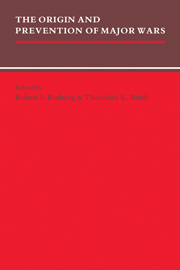Old Wars and Future Wars: Causation and Prevention
Published online by Cambridge University Press: 02 December 2009
Summary
History is the study of events that have happened only once; political science is the effort to generalize about them. These caricatures sometimes seem an apt description of mutual reactions when members of the two professions discuss the origins and prevention of major wars. It might be amusing were it not that the next major war could be the last. Nuclear war is too serious to leave to either historians or political scientists alone.
As Waltz argues below, conflict may be endemic in human behavior, but war has its origins in social organization. Nonetheless, general theories of the causes of war can be misleading. “It is assumed, for instance, that there is a class of events involving human behavior that can be legitimately subsumed under a single term ‘war.’ True, the events have a common observable factor — organized violence perpetrated by groups of people upon each other. But that is near the extent of the commonality.” This volume does not search for a common set of causes of all violence from tribal vendettas to world wars. Instead, it focuses on the upper end of the scale.
Since the development of the modern state system in Europe some four centuries ago, there have been ten general wars involving a majority of the major powers and a high level of battle deaths. Some of these wars stand out in terms of their consequences for the hierarchy and structure of the system of states.
- Type
- Chapter
- Information
- The Origin and Prevention of Major Wars , pp. 3 - 12Publisher: Cambridge University PressPrint publication year: 1989



